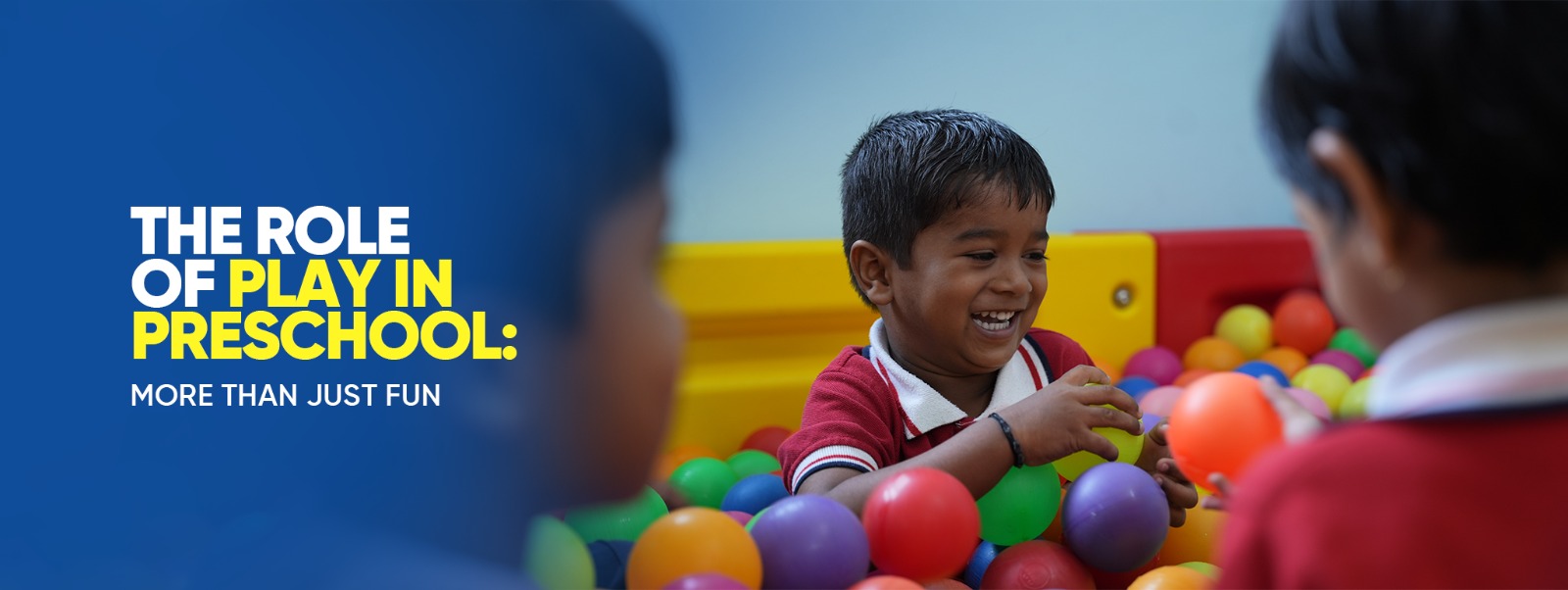
The Role Of Play in Preschool: More Than Just Fun
Children playing and laughing are often the first thoughts that spring to mind when you think about preschool. It’s simple to write off play as a means of passing the time or letting off steam. Play is so much more than that, though. Play is an essential component of learning and development for toddlers. It is how they discover the world, develop their social skills, and cultivate their creativity. This blog will explore the importance of play in preschool and how it influences your child’s development in unexpected ways.
1. Cognitive Development Through Play
Preschoolers practice solving problems during playtime. Children are developing their critical thinking and reasoning abilities, whether they are sorting shapes, constructing a tower out of blocks, or solving a basic problem. Pretend play and other such activities foster their creativity and help them build their capacity for abstract thought. For instance :
- Building with blocks teaches cause-and-effect linkages, balance, and fundamental physics ideas.
- Children learn roles, responsibilities, and real-world situations via pretend play, which also fosters creativity.
- Introduce basic math principles like counting and pattern identification through board games or group activities.
In many respects, play lays the groundwork for later academic abilities such as science, arithmetic, and problem-solving.
2. Social Skills Development
Children frequently engage with peers outside of their family for the first time in preschool. They learn to share, take turns, and collaborate via play. They learn to settle disagreements, comprehend social signs, and correctly express their emotions via play. For example:
- Group Play: Promotes cooperation and compromise.
- By putting players in other people’s shoes, role-playing games help them develop empathy.
- Sharing toys promotes tolerance and a sense of justice.
In addition to being essential for forming friendships, these abilities also serve as a foundation for wholesome relationships in the future.
3. Emotional Benefits of Play
Children may express themselves through play in a secure and encouraging setting. It facilitates the processing of all emotions, including fear, irritation, and enthusiasm. For instance :
- To feel brave, a youngster may act like a superhero.
- They may be able to better understand their family dynamics by playing house.
- Drawing and working with clay are examples of artistic pursuits that offer a means of self-expression.
Children who participate in these activities develop resilience and emotional control, which improves their ability to deal with difficulties.
4. Physical Development
Young children have a lot of energy, and play helps them direct it towards constructive pursuits that support their physical well-being. Children develop their motor abilities, balance, and coordination via exercises like running, leaping, and climbing. Activities such as these also help to strengthen fine motor abilities. Other such activities are :
- Colouring or drawing.
- Constructing using little bricks.
- Using playdough for play.
In addition to improving their general health, these exercises get kids ready for writing, cutting, and other school-related duties.
5. Language and Communication Skills
Have you ever seen how children’s playtime talks blossom? They’re always practicing communication, whether it’s recounting their actions or allocating roles in a game. Through play, they learn new words and gain an understanding of narrative and sentence construction. For example :
- Through pretend play, they may increase their vocabulary by using terms associated with various jobs, such as “doctor,” “cashier,” or “chef.”
- Storytelling Games: Develop their descriptive language and event sequencing skills.
- Play interactive games to help children develop their conversational abilities by encouraging them to listen and answer.
Stronger language development and more effective communication are the results of these encounters over time.
6. Encourages Independence
Additionally, play promotes independence. Children make decisions, take chances, and grow from their errors when they play freely. Whether they choose to paint a painting or construct a big structure, they are developing their decision-making skills and increasing their self-confidence.
Unstructured playtime is especially beneficial because it gives kids the chance to take charge, explore their interests, and grow as individuals.
7. Promotes Lifelong Love for Learning
Children are more likely to have a favourable attitude towards learning when it is enjoyable. Curiosity and awe for the world are fostered via play. Play helps kids connect learning with fun and exploration by letting them try new things and explore without worrying about failing. They can carry this mentality with them throughout their academic career.
8. The Role of Teachers and Parents in Play
Adults play an essential supporting role in play, even when children take the lead. Preschool teachers foster an atmosphere where play is both entertaining and instructive. They:
- Offer a range of materials and toys to promote discovery.
- To learn about children’s interests and developmental requirements, watch them while they play.
- When necessary, gently direct play to settle problems or present new ideas.
Parents can extend this learning at home by:
- Providing opportunities for unstructured play.
- promoting outdoor pursuits.
- Playing pretend with their kids to strengthen their relationship and set an example of good behaviour.
9. Types of Play in Preschool
There are several forms of play, and each one supports distinct developmental goals :
- Free play is unstructured play in which kids may express their creativity and imagination.
- Guided Play: educator-led, structured activities that impart particular ideas.
- Games that require movement, such as dancing or sprinting, are referred to as physical play.
- Creative play includes things like constructing, making, and sketching.
- Social Play: Games for groups that promote cooperation and teamwork.
Holistic growth is ensured by a well-balanced combination of various kinds.
Final Thoughts
For preschoolers, play is much more than simply enjoyable. It is an effective instrument that promotes their social, emotional, cognitive, and physical development. You’re giving your child the finest start in life by promoting play at home and at school. Never forget that play is a chance to develop, learn, and be ready for the future.
Discover the Joy of Learning at Kiran International School
At Kiran International School, we think that play has the ability to change people. Our preschool curriculum is made to blend enjoyment and learning, guaranteeing that your kid has a rich early life. Our cutting-edge facilities, compassionate instructors, and emphasis on holistic development create the ideal setting for your kid to flourish.
Come meet us now to find out how we can impact your child’s educational path. Together, let’s lay the groundwork for happiness and curiosity!





